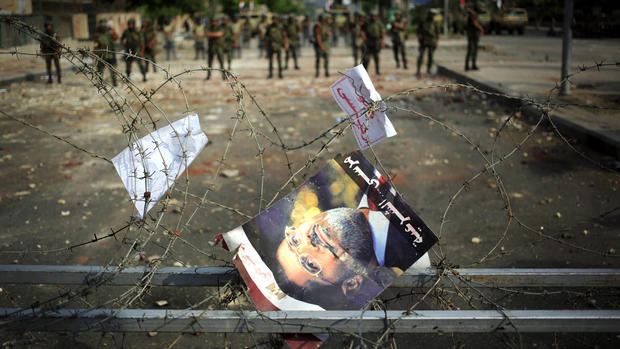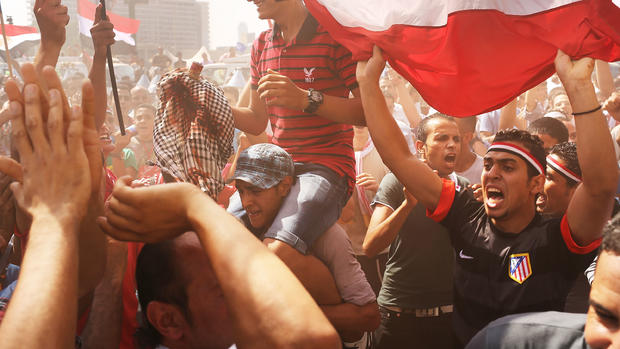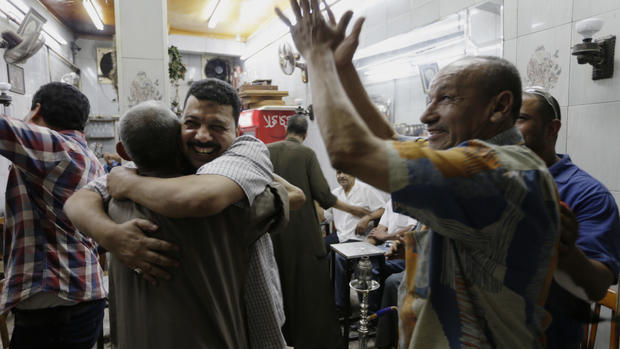Egypt's Muslim Brotherhood keeps protests alive
CAIRO Graffiti around the Egyptian capital proclaim the Muslim Brotherhood's call for new anti-military protests Sunday - dotting walls, light poles and signposts for miles down main avenues and near the presidential palace from which the group was ousted three months ago. It's an impressive show of survival, giving the image that the Brotherhood is everywhere, just under the surface.
But the Brotherhood is in an existential crisis, unsure how to adapt under the heaviest crackdown since the 1960s, carried out by a new military-backed government determined to end the group, at least in the form it has been in for the past 85 years.
With neither side interested in talking for now, the Brotherhood's crippled leadership is reduced to minimizing its losses until it finds an exit from the crisis. It is turning to its international leaders for help in decision-making and waging a campaign of persistent, if small protests to prove it cannot be crushed.
Few political organizations in the world have undergone a reversal as dramatic as the Muslim Brotherhood. It was the dominant force of Egypt's fledgling democracy after the 2011 fall of autocrat Hosni Mubarak. It rode the first free elections to win the presidency and parliament, and was poised to mold the country to its vision. Now, three months after the military coup that removed President Mohammed Morsi, it has been virtually decapitated, much of its leadership in prison, the rest in hiding and on the run.
Morsi has languished in military detention, unseen by the outside world, since the July 3 coup. He faces trial, as do the Brotherhood's top leaders and some 2,000 other jailed members.
The Brotherhood's nationwide network of members has fled underground, and the group that often boasted it represents the real Egypt finds itself vilified by government officials, the media and a large sector of the Egyptian public as extremists and terrorists.
Now it and the new government are locked into what is effectively a long, possibly violent process that will determine how the Brotherhood could fit into a democracy that those who toppled Morsi say they want to build. Many Egyptians say Morsi's year in power proved the Brotherhood is fundamentally undemocratic and seeks only to monopolize power. Hard-line Brotherhood opponents say it can have no place in politics, but moderates recognize it cannot be permanently repressed in a truly free system.
The Brotherhood's long-term aim is to preserve the tight-knit, largely secretive structure of cadres, businesses and charities that made it a wealthy political powerhouse. Eventually, many Brotherhood members believe, the interim government will have to back down to ensure stability as it tackles Egypt's multiple woes, particularly the struggling economy.
"This economic crisis won't end unless calm is restored to the street, through some kind of a political deal," said Islam Tawfiq, a Brotherhood youth member who coordinates with its senior figures.
For now, each side is using what cards it has to pressure the other. Late last month, a court ordered a sweeping ban on the Brotherhood. But the order is caught up in appeals and so far, authorities have been vague over implementing it - apparently a maneuver to keep the threat hanging over the group. So far, for example, the Brotherhood's political party has not been declared dissolved.
The Brotherhood is angling to endure a crackdown that - while painful - also helps keep group cohesion under the pressure of a shared plight. It has publicly stuck to its most hard-line demands - the reinstatement of Morsi as president and restoration of the Morsi-era constitution. Even some Brotherhood members recognize the possibility for that has passed. But the group uses the demands to energize its members and keep up street pressure as leverage in any eventual negotiations, which could bring concessions like easing the crackdown or releasing jailed members.
The disarray in the Brotherhood leadership complicates the situation. Two prominent Brotherhood figures, Amr Darrag and Mohammed Bishr, have met repeatedly with European foreign policy chief Catherine Ashton, who has also been talking to the military and government. But Brotherhood members on the ground repeatedly deny Bishr or Darrag speak for them.
Decision-making is not in the hands of the imprisoned leadership, said Tharwat el-Kharbawi, once a prominent Brotherhood member who broke from the group years ago but maintains contacts inside it.
Instead, the group has set up a crisis committee that is at least partially abroad, including figures from the group's international branches, he said. Some of the group's public statements now come from an office in London. Brotherhood deputy leader Mahmoud Ezzat - the highest-ranking figure not in prison, though he is in hiding - is also playing a major role, el-Kharbawi said.
The new government has so far shown little interest in compromise as it pushes ahead with a transition plan, working to amend the constitution and preparing for presidential and parliamentary elections due early next year.
But there are differences over how far to take the crackdown - whether to outright crush the Brotherhood or just leave it as a reduced political force, breaking its networks and forcing it to drop its historical, secretive program.
Security agencies are the most intent on destroying the group, said Ziad el-Oleimi, a revolutionary activist and former lawmaker who belongs to a political party that is in the interim government. The military and intelligence agencies, he said, are "smarter" and realize a security fist won't work in post-revolution Egypt. "They realize there are new parties that have a stake in the political process. They realize they must find a way to contain them or they will blow up in their face," el-Oleimi said.
From the civilian politician side, interim Deputy Prime Minister Ziad Bahaa-Eldin has put forward initiatives to find a political solution but met resistance from security officials, el-Oleimi said.
El-Kharbawi and el-Oleimi said they believe the remaining Brotherhood leadership is open to some compromise. But at the same time, they have fired up the Brotherhood youth with promises of victory to keep the protest movement going.
"Going back without any gains will not be accepted by the youth," el-Kharbawi said.
Almost daily, small Brotherhood protests are held, usually by a few dozen youth. On Tuesday night, a small band entered Tahrir Square for the first time since Morsi's ouster, making a symbolic foray into the country's most prominent political stage.
Sunday's planned protests are touted as a major new push, coinciding with commemorations of Egypt's Oct. 6 opening strike in the 1973 war with Israel. The day is likely to also bring major rallies in support of the military and its chief, Gen. Abdel-Fattah el-Sissi, opening the possibility of new clashes. The Brotherhood talks of a new march on Tahrir and of setting up new sit-in camps, like those that the security forces broke up on Aug. 14 with assaults that left hundreds of Morsi supporters dead.
In a show of bravado, the Brotherhood issued a sharply worded statement Thursday, urging Egyptian soldiers to rebel against their commanders. It compared "the leaders of the bloody coup" to Adolph Hitler, the Roman emperor Nero and other historic tyrants.
"There will be an escalation against the coup," said Tawfiq, the Brotherhood youth figure. "We will go down in the streets and we may not come back until the president is reinstated."


